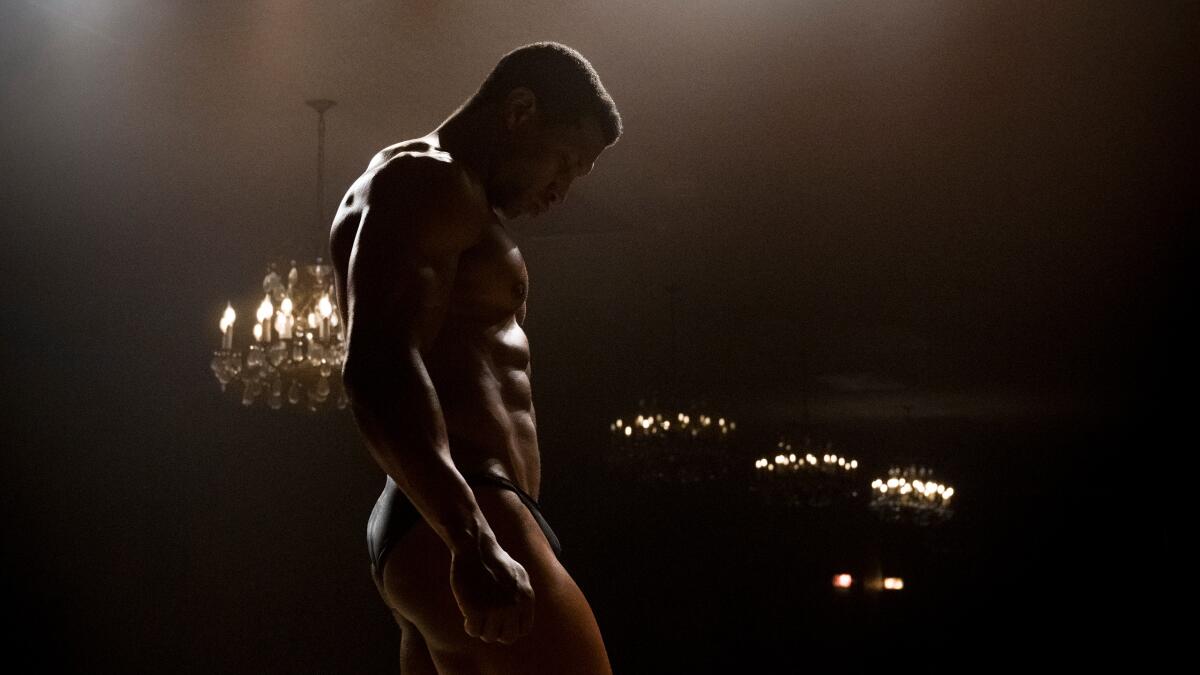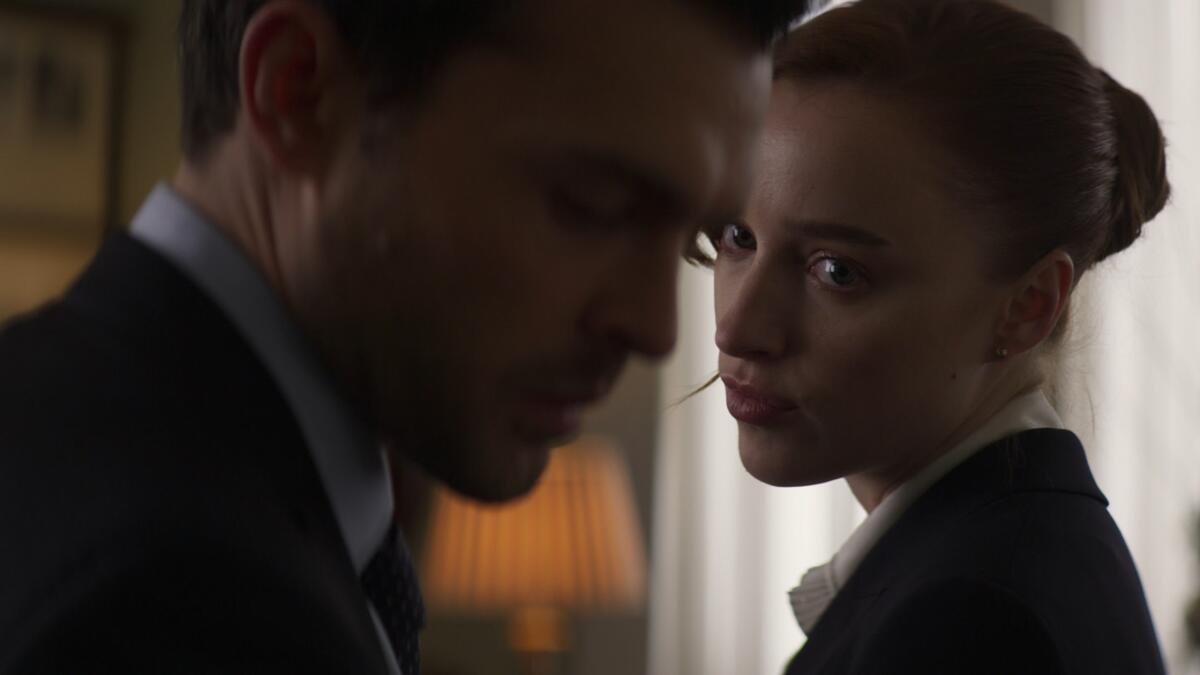Psychological thrillers ‘Fair Play’ and ‘Magazine Dreams’ jolt Sundance competition to life

- Share via
PARK CITY, Utah — For the seasoned Sundance-goer, returning to this film festival for the first time since January 2020 can feel like a half-comforting, half-disorienting resumption of familiar rituals. Aside from the occasional masked face peeking out from the usual parka-and-beanie ensemble, you almost might be able to convince yourself that nothing has really changed, that a three-year pandemic blip didn’t really happen. Here we are, after all, lining up as always in the same crowded lobby of the Eccles Theatre, a 1,269-seat high-school auditorium that serves as the festival’s largest venue. And there we go again, shuttling off to Main Street for a midnight movie at the Egyptian Theatre, because that’s what you do at Sundance, damn it, and who doesn’t want to see Sarah Snook go on a scream-queen rampage in an Australian mommy-dearest freakout called “Run Rabbit Run”?
That movie, which delivers a succession of initially effective frights before devolving into “Run Rabbit Run Rinse Repeat,” might not have been the second coming of “Hereditary.” But I was glad to see it in a packed Park City house regardless, happily sandwiched between two friends whose nervous giggles, along with Snook’s characteristically arresting performance, were more than enough to keep me in my seat. But will you stay in yours? Shortly before “Run Rabbit Run’s” first screening Thursday night, a programmer announced that the movie had been acquired by Netflix. Which means you’ll get to see it soon enough in the comfort of your own home, though with the luxury of skipping ahead or even turning it off if you find it too scary or derivative or boring.

That’s the streaming addict’s prerogative, of course, and God knows Netflix releases more than its share of the skippable. But if the return to an in-person Sundance has shown us anything in these early days, it’s that even a movie you might have been tempted to fast-forward at home — or avoid in the first place — can become something altogether more involving, and even indelible, when projected on a big screen in front of a stoked crowd. Movies as strong as “Fair Play” and “Magazine Dreams,” which jolted the festival’s U.S. dramatic competition to life on Friday afternoon, might even convince you they have the makings of a potential breakout, even if the fraught economics of the movie industry — driven home by recent news of widespread Regal Cinemas theater closures across the U.S., six of them in Southern California — tell a much more depressing story.
But that’s enough existential doom-and-gloom for now. I come to this festival not to write premature obituaries for cinema, but rather to bear witness to its promising signs of rude good health. And there were such signs aplenty in “Fair Play,” a wicked-sharp psychological thriller that marks the scarily assured feature debut of the writer-director Chloe Domont. It tells the story of Emily and Luke (Phoebe Dynevor and Alden Ehrenreich, both superb), two ambitious analysts at the same Manhattan hedge fund. They are also, secretly, a couple — a violation of company policy that becomes ever more complicated when Emily gets the major promotion they had both assumed would go to Luke.
Showing at Sundance, Chloe Domont’s feature debut, ‘Fair Play,’ stars Phoebe Dynevor and Alden Ehrenreich as a couple who come undone under professional pressure.
Why they assumed such a thing to begin with is a mystery that Domont will spend the rest of this movie examining, and if the answers are fairly obvious — the fragility of the white male ego in general, the pervasiveness of finance-bro misogyny in particular — the ensuing twists and turns happily are not. Darting nimbly between her protagonists’ perspectives while making it abundantly clear where her sympathies lie, Domont transforms a couple’s bedroom and a corporate boardroom into brutally complementary war zones. She also packs the movie with memorable supporting players, including the great Eddie Marsan as a reptilian CEO and Rich Sommer as a much more menacing version of the schlubby adman he played on “Mad Men.”
That series, so astute in its grasp of an earlier era of corporate sexism, isn’t the only thing that may come to mind as you watch “Fair Play.” At times I flashed back on “Margin Call,” that elegantly chilled drama about Wall Street on the eve of the 2008 financial crisis; at a few others my mind returned to “Promising Young Woman,” though to these eyes, Domont’s fearless consideration of male violence and female reckoning draws far more blood, both literally and figuratively. Is it possible that both those movies were at front of mind because I’d seen them both for the first time here in Park City? Maybe so. One of the pleasures of steady festival-going is that you don’t just retain memories of (some of) the movies you saw, but also of where and when you saw them. If you’re lucky, you might even remember the charge that they sent through the crowd, the sense of an exciting discovery being made in near-unison.

“Fair Play” delivered that charge, and so, to vastly grimmer and more slow-burning effect, did “Magazine Dreams,” a brutal study of physical extremity and psychological meltdown built around an entirely astonishing lead performance from Jonathan Majors. For 124 patiently observed minutes, Majors fully inhabits the ripped abs, swollen arms and bruised soul of a bodybuilder named Killian Maddox — a name that Killian keeps repeating, in full, throughout the movie. He hopes that name will be famous one day, that after years of obsessively pumping iron, pounding 6,000 calories a day and injecting himself with steroids, he might eventually grace the covers of men’s fitness magazines across America. It’s a dream that — as shot in gauzily hypnotic long takes of bulked-up male bodies strutting and posing under chandelier lights — flies defiantly in the face of the trauma, poverty and barely modulated rage that define Killian’s existence.
The repetition of “Killian Maddox” works its own unsettling effect on the audience, partly because the first four letters spell “kill,” and partly because filmmaker Elijah Bynum clearly wants us to think about another unforgettably named sociopath-antihero, namely Travis Bickle. The invocations of “Taxi Driver,” a classic that American filmmakers never tire of referencing, are numerous and at times obvious to the point of ritualistic, from the ill-advised date that Killian goes on with a sweet co-worker (Haley Bennett) to the unnerving sight of him purchasing and assembling a firearm. That sequence and others, which all but dare us to see word bubbles like “mass shooting” and “deranged incel” hovering around Killian, tied my own definition-free stomach muscles in knots. (One can only imagine how those scenes will play during the movie’s remaining Sundance screenings in light of Saturday’s mass shooting in Monterey Park, Calif.)
The first in-person Sundance since 2020 is about to begin. Our critic has some early recommendations, including ‘The Eternal Memory’ and ‘Mami Wata.’
But Bynum is also conducting, in the tense and operatic longueurs of his storytelling, a provocative inquiry into Killian’s capacity for violence — a capacity that he both acknowledges and repeatedly questions by having Killian entertain a murderous fantasy, again and again, only to pull him back from the brink. This kind of bait-and-switch can grow wearying over the course of the movie’s long and not entirely sustained two-plus-hour progress, but it is also rooted in legitimate questions. How much truth can we glean from Killian’s own oft-alluded-to criminal record, especially given the overaggressive policing to which we see him being subjected? Does he pose more or less of a threat to society than, say, the racist white men who beat him up in retaliation, following a series of escalating altercations?
In these moments, Killian’s body — which is also, irreducibly and inseparably, Majors’ body — becomes both a hypnotic visual spectacle and a kind of argumentative vessel, one that absorbs the fears and assumptions that get attached to Black men in America by default. Those assumptions will surely continue to be debated — though the greatness of Majors’ performance, I suspect, will not — as this furious, darkly funny and agonizingly bleak vision makes its way through Park City and hopefully beyond.
More to Read
Only good movies
Get the Indie Focus newsletter, Mark Olsen's weekly guide to the world of cinema.
You may occasionally receive promotional content from the Los Angeles Times.













